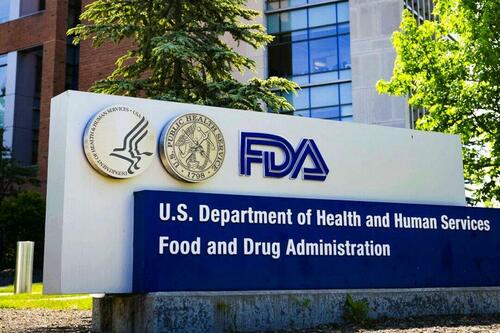Authored by Amie Dahnke via The Epoch Times (emphasis ours),
In an effort to encourage the discovery of more treatment and diagnostic options in the medical field, the U.S. Food and Drug Administration (FDA) has finalized a rule allowing certain clinical trials to operate without obtaining informed consent from participants.

The hitch? The study cannot pose more than minimal risk to humans and must include appropriate safeguards to protect the rights, safety, and welfare of those involved.
The rule was issued in late December 2023 and went into effect on Jan. 22, 2024.
“We anticipate this new rule will enable minimal risk research that would not be practicable to conduct otherwise,” Dr. Robert M. Califf, serving commissioner of Food and Drugs for the FDA, wrote on his FDA blog, “Catching Up With Califf.“ ”This could include studies comparing the effectiveness of approved products to determine which option works best for certain patients.”
The FDA initially proposed the rule in November 2018, permitting an institutional review board to waive the requirement for informed consent under certain conditions. The agency received fewer than 50 comment letters on the proposed rule from academia, institutional review boards (IRBs), public advocacy groups, industry, trade organizations, public health organizations, and citizens.
Most of the comments favored the agency’s efforts, supporting the rule because it reduced administrative burdens on both IRBs and researchers while encouraging valuable research on important health issues affecting the public without putting trial participants at risk, according to the FDA.
Not all comments were supportive, with some warning that “a waiver of consent may be necessary and ethically justifiable for certain types of clinical investigations that are critical for medical advancement, patient care, and safety.” Two commenters believed the rule simply goes “against the spirit” of protecting humans in medicine.
However, many researchers noted in their support that certain minimal-risk trials are nearly impossible to conduct if consent is required. One example includes the analysis of a retrospective records review; before the new rule, such a study required informed consent from the patients whose data were being studied. By being able to dig into such information, these researchers and the FDA argue they may be able to make medical advancements without sacrificing patient safety or rights.
Much of the pushback against the new rule suggested the changes would allow IRBs to compromise on standards more and more, adding that the term “minimal risk” is too vague and could be misinterpreted or abused. The result would be decreased public trust in research and health care providers.
“No third parties, including IRBs, should be allowed to make decisions for study subjects as to what constitutes ’minimal risk,'” one commenter stated.
Minimal risk, as defined by the FDA, means the likelihood of experiencing harm or discomfort is not greater for a subject during a study than for them during everyday tasks. In other words, there’s minimal risk in nearly every activity, from walking to putting away the dishes to picking the kids up from school; the study’s risk cannot exceed the risk one experiences daily.
The ruling comes at a time when the FDA can’t afford to lose any more public trust; the agency has been attempting to rebuild its reputation after the COVID pandemic, during which many believe it was heavily swayed by political influence. The agency has been called upon by industry leaders to tighten its prescription drug and medical device approval process—and to make it more transparent.
In his blog post, Dr. Califf says the new rule is a start.
“These efforts will promote additional robust clinical research to generate the evidence needed to inform clinical decision making and ultimately enhance treatment and diagnostic options for patients,” he wrote.